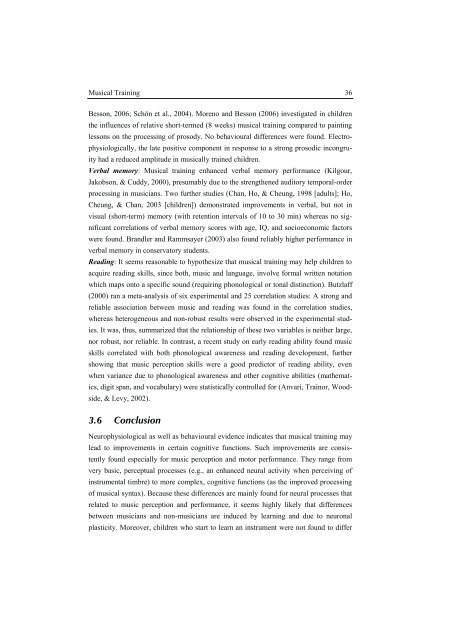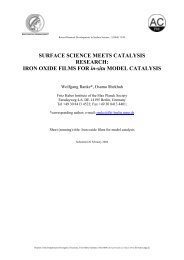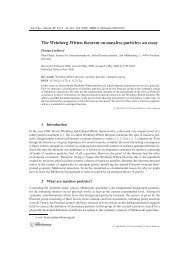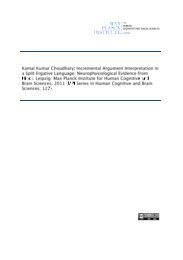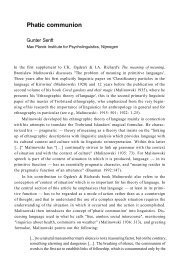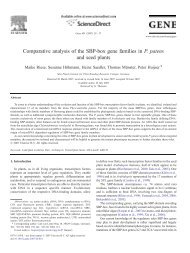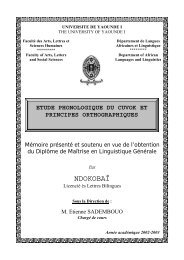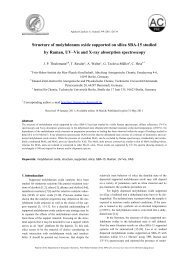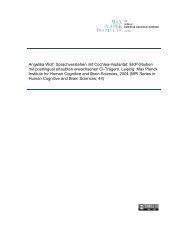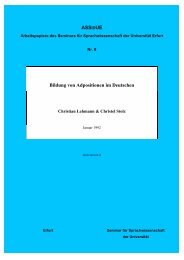Neural Correlates of Processing Syntax in Music and ... - PubMan
Neural Correlates of Processing Syntax in Music and ... - PubMan
Neural Correlates of Processing Syntax in Music and ... - PubMan
Create successful ePaper yourself
Turn your PDF publications into a flip-book with our unique Google optimized e-Paper software.
<strong>Music</strong>al Tra<strong>in</strong><strong>in</strong>g 36<br />
Besson, 2006; Schön et al., 2004). Moreno <strong>and</strong> Besson (2006) <strong>in</strong>vestigated <strong>in</strong> children<br />
the <strong>in</strong>fluences <strong>of</strong> relative short-termed (8 weeks) musical tra<strong>in</strong><strong>in</strong>g compared to pa<strong>in</strong>t<strong>in</strong>g<br />
lessons on the process<strong>in</strong>g <strong>of</strong> prosody. No behavioural differences were found. Electrophysiologically,<br />
the late positive component <strong>in</strong> response to a strong prosodic <strong>in</strong>congruity<br />
had a reduced amplitude <strong>in</strong> musically tra<strong>in</strong>ed children.<br />
Verbal memory: <strong>Music</strong>al tra<strong>in</strong><strong>in</strong>g enhanced verbal memory performance (Kilgour,<br />
Jakobson, & Cuddy, 2000), presumably due to the strengthened auditory temporal-order<br />
process<strong>in</strong>g <strong>in</strong> musicians. Two further studies (Chan, Ho, & Cheung, 1998 [adults]; Ho,<br />
Cheung, & Chan, 2003 [children]) demonstrated improvements <strong>in</strong> verbal, but not <strong>in</strong><br />
visual (short-term) memory (with retention <strong>in</strong>tervals <strong>of</strong> 10 to 30 m<strong>in</strong>) whereas no significant<br />
correlations <strong>of</strong> verbal memory scores with age, IQ, <strong>and</strong> socioeconomic factors<br />
were found. Br<strong>and</strong>ler <strong>and</strong> Rammsayer (2003) also found reliably higher performance <strong>in</strong><br />
verbal memory <strong>in</strong> conservatory students.<br />
Read<strong>in</strong>g: It seems reasonable to hypothesize that musical tra<strong>in</strong><strong>in</strong>g may help children to<br />
acquire read<strong>in</strong>g skills, s<strong>in</strong>ce both, music <strong>and</strong> language, <strong>in</strong>volve formal written notation<br />
which maps onto a specific sound (requir<strong>in</strong>g phonological or tonal dist<strong>in</strong>ction). Butzlaff<br />
(2000) ran a meta-analysis <strong>of</strong> six experimental <strong>and</strong> 25 correlation studies: A strong <strong>and</strong><br />
reliable association between music <strong>and</strong> read<strong>in</strong>g was found <strong>in</strong> the correlation studies,<br />
whereas heterogeneous <strong>and</strong> non-robust results were observed <strong>in</strong> the experimental studies.<br />
It was, thus, summarized that the relationship <strong>of</strong> these two variables is neither large,<br />
nor robust, nor reliable. In contrast, a recent study on early read<strong>in</strong>g ability found music<br />
skills correlated with both phonological awareness <strong>and</strong> read<strong>in</strong>g development, further<br />
show<strong>in</strong>g that music perception skills were a good predictor <strong>of</strong> read<strong>in</strong>g ability, even<br />
when variance due to phonological awareness <strong>and</strong> other cognitive abilities (mathematics,<br />
digit span, <strong>and</strong> vocabulary) were statistically controlled for (Anvari, Tra<strong>in</strong>or, Woodside,<br />
& Levy, 2002).<br />
3.6 Conclusion<br />
Neurophysiological as well as behavioural evidence <strong>in</strong>dicates that musical tra<strong>in</strong><strong>in</strong>g may<br />
lead to improvements <strong>in</strong> certa<strong>in</strong> cognitive functions. Such improvements are consistently<br />
found especially for music perception <strong>and</strong> motor performance. They range from<br />
very basic, perceptual processes (e.g., an enhanced neural activity when perceiv<strong>in</strong>g <strong>of</strong><br />
<strong>in</strong>strumental timbre) to more complex, cognitive functions (as the improved process<strong>in</strong>g<br />
<strong>of</strong> musical syntax). Because these differences are ma<strong>in</strong>ly found for neural processes that<br />
related to music perception <strong>and</strong> performance, it seems highly likely that differences<br />
between musicians <strong>and</strong> non-musicians are <strong>in</strong>duced by learn<strong>in</strong>g <strong>and</strong> due to neuronal<br />
plasticity. Moreover, children who start to learn an <strong>in</strong>strument were not found to differ


